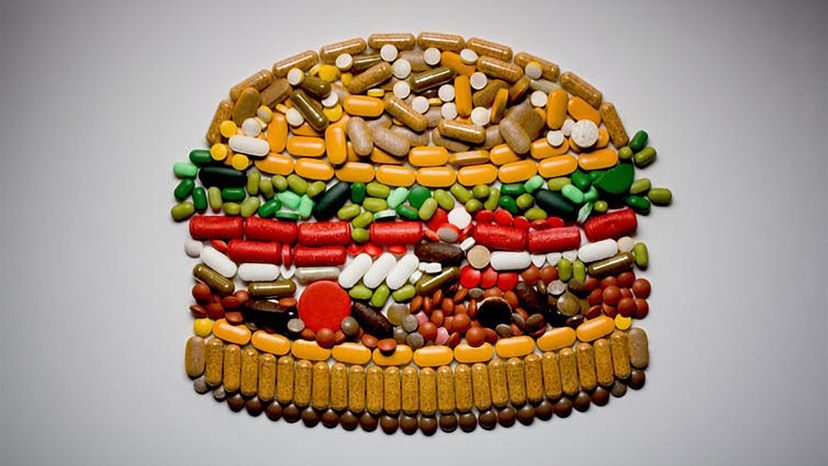Spend any time watching tv or scrolling by way of social media, and you will inevitably see commercials for capsules, powders and potions that promise to develop muscle, shed physique fats, enhance your focus and resurrect your youth.
Most of us have used them. Finally rely, the Nationwide Heart for Well being Statistics discovered that over 50 % of all adults in America have used a complement prior to now 30 days. The middle used knowledge from 2017 and 2018, however newer polls recommend this determine to be nearer to over 70 %.
Globally, the dietary complement business was mentioned to be price over $140 billion in 2020. Inside the US alone, this determine is estimated to be round $36 billion – regardless of proof that almost all of those dietary supplements don’t work.
How did merchandise with questionable advantages and costly costs turn into so mainstream? Dietary dietary supplements aren’t a brand new phenomenon. Their historical past dates again at the very least 150 years, they usually’ve been capable of thrive in the US because of false guarantees, fanatical adherents and weak regulation.
Contents
- Stoking an Urge for food for Options
- Health Dietary supplements Change into All of the Rage
- The Flailing FDA
- A Single Promise Wrapped in a Capsule
Stoking an Urge for food for Options
Given the outlandish claims that may adorn complement labels, it’s maybe unsurprising that among the earliest complement fanatics have been non secular figures. Their dietary supplements weren’t capsules, however quite meals options.
Sylvester Graham, born in 1794, was an American Presbyterian minister who preached salvation by way of a vegetarian food plan.
“
Transcendental Graphics/Getty Pictures
A part of Graham’s educating centered on temperance and entire grain meals. Graham’s followers made and marketed Graham bread, crackers and flour with the promise that these merchandise would promote righteous residing and everlasting salvation.
Whereas Graham did not formally endorse these merchandise, his religious successor, Dr. John Harvey Kellogg, was an keen proponent of his household’s line of latest meals. A physician, inventor and businessman rolled into one, Kellogg ran his personal well being spa in Michigan – the Battle Creek Sanitarium – through the late-Nineteenth and early-Twentieth century. Though he didn’t create cornflakes – that was his brother, Will – Kellogg was chargeable for advertising and marketing flours, protein replacements, granolas and peanut butters. Just like the Graham merchandise, Kellogg’s meals have been linked to improved well being and advantage.
Graham crackers and granola could appear comparatively benign in comparison with some well being and wellness merchandise bought right now, reminiscent of detox teas and vitamin-enriched waters. However they have been however necessary in selling the still-powerful message underpinning a lot of the dietary supplements we see right now: This product will enhance your well being and your life.
Health Dietary supplements Change into All of the Rage
When educating this matter to college students, I recount a discovery made by historians John Truthful and Daniel Corridor after they have been researching the historical past of protein powders.
Someday within the Nineteen Forties, the American nutritionist Paul Bragg reached out to barbell producer Bob Hoffman.
On the time, Hoffman was making a small fortune promoting his York Barbell exercise gear all through the US. Bragg, in the meantime, had firmly established himself as a number one knowledgeable on different diet. Sensing a probably profitable partnership, Bragg wrote to Hoffman with an thought.
Within the letter, Bragg advised Hoffman the elemental flaw in his York enterprise: his merchandise have been sturdy. If somebody purchased a barbell set within the Thirties, it was seemingly they might nonetheless use it within the Nineteen Fifties. Bragg advisable promoting dietary dietary supplements, which might have to be changed on a biweekly or month-to-month foundation.
“
Fairfax Media Archives/Getty Pictures
Hoffman determined to go on partnering up with Bragg, however he quickly acknowledged the concept’s potential. Within the Nineteen Fifties, nutritionist and bodybuilding coach Irving Johnson started promoting protein dietary supplements in Hoffman’s Energy & Well being journal. Produced from soy, Johnson’s "Hello Protein" powder was an enormous success.
Inside a yr, Hoffman banned Johnson from his journal and commenced promoting his personal "Hello-Proteen" powder. Protein dietary supplements, as an business, grew in measurement and scope. Soy protein merchandise have been ultimately changed by milk protein powders within the Sixties. By the late Nineties a number of different derivatives, starting from pea protein to collagen powders, existed.
The scale and scope of different choices grew with time. Vitamin and mineral dietary supplements turned standard within the Nineteen Fifties. Vitality drinks and power boosters like creatine began flying off the cabinets within the late Nineteen Eighties and early Nineties. Prohormones – which purported to construct muscle and have been ultimately banned – have been launched within the early 2000s. Every decade, earnings ballooned, as did the creativity within the branding of the merchandise.
Outlandish guarantees have been commonplace. Vitamin producers promised cancer-curing merchandise, protein powders marketed steroid-like results, whereas pre-workout dietary supplements – typically laced with methamphetamines – provided boundless power.
Authorities authorities did little to cease them.
The Flailing FDA
It wasn’t for lack of making an attempt. The dietary supplements business and federal authorities have lengthy been taking part in a recreation of cat and mouse.
When Hoffman and others started promoting dietary supplements, they have been technically topic to the insurance policies of the Meals and Drug Administration. However through the Nineteen Fifties, the FDA was ill-equipped to manage dietary dietary supplements. Nevertheless, among the producers’ outlandish claims and unhygienic practices began to draw the eye of the regulatory physique, which quickly sought to achieve extra management.
By the Sixties, Hoffman – who routinely claimed his merchandise added kilos of muscle tissue in speedy time – turned a goal of the FDA. The key to his Hello-Proteen powder? A giant mixing vat by which he stirred Hershey’s chocolate powder along with soy protein powder utilizing a rowing oar.
Hoffman was usually censored however by no means stopped. Through the Sixties and Seventies, the FDA usually locked horns with producers for his or her lax manufacturing strategies and incredulous claims.
The issue was that the FDA was by no means capable of totally regulate the business.
From 1968 to 1970, Congress held a number of public hearings on the FDA’s plans to manage dietary supplements. Legislators, complement commerce associations, producers and residents mentioned restrictions and bans on sure merchandise, reminiscent of making it unlawful to promote dietary supplements with vitamins in extra of 150% of every day consumption suggestions.
Private and non-private outcry stopped such plans of their tracks. The FDA was compelled to interact in light-touch regulation. In 1975, a courtroom ruling allowed dietary supplements to promote themselves as pure. One yr later, the Rogers Proxmire Act prohibited the FDA from imposing limits on vitamin and mineral quantities in dietary supplements.
The FDA retained the best to pursue baseless or deceptive claims, however this did little to decelerate the business. The variety of merchandise continued to develop.
Put merely, it turned not possible to supervise what went into merchandise. This additionally explains why so many dietary supplements embody a word to say they aren’t FDA accredited or endorsed.
“
JW LTD/Getty Pictures
Within the early-Nineties the FDA resumed its efforts to manage the complement business. Specifically, the company needed to extend its personal enforcement powers whereas concurrently making it unlawful to promote therapeutic claims on complement labels. As soon as extra, personal lobbying and public outcry watered down the company’s powers.
In 1994, Congress handed the Dietary Complement Well being Training Act, which utterly modified the dietary panorama. Dietary supplements have been now categorised as meals, not medicines or meals components. By classifying dietary supplements as meals, and never medication, the act lowered the burden of proof for producer’s claims.
The laws additionally expanded which merchandise might be categorised as a complement – and, subsequently, not be subjected to the FDA’s purview.
At the moment, accountability is positioned on producers to self-regulate their probably dangerous merchandise. This does expose producers to lawsuits, however it may be a protracted and prolonged course of for customers. In impact, dietary supplements are dropped at market earlier than being completely examined. Thus, many merchandise are bought regardless of containing banned substances.
A Single Promise Wrapped in a Capsule
Because the mid-Twentieth century, dietary dietary supplements have been promoted in a wide range of methods inside the US. However acknowledging the variations in product, style and value, they’ve usually been marketed primarily based upon a single promise: This product will, in a roundabout way, enhance your life.
Whether or not that is true or not for the person product – some dietary supplements do, the truth is, work, with creatine being one instance – it has turn into problematic at a broader degree. Federal businesses within the U.S. have frequently been impeded from accurately overseeing the market. Personal lobbying and public outcry concerning the authorities eager to "take away your nutritional vitamins" have inspired malpractice and harmful messaging.
A examine from 2018 discovered 776 cases of unapproved pharmaceutical components being added to dietary supplements in the US from 2007 to 2016. Many of those additions have been comparatively innocent. However a number of components – from steroid compounds to banned weight reduction medication – weren’t.
Dietary supplements may promise an excellent deal. However in actuality, most of them are articles of religion.
Conor Heffernan is an assistant professor of bodily tradition and sport research on the College of Texas at Austin.
This text is republished from The Dialog below a Artistic Commons license. Yow will discover the unique article right here.







